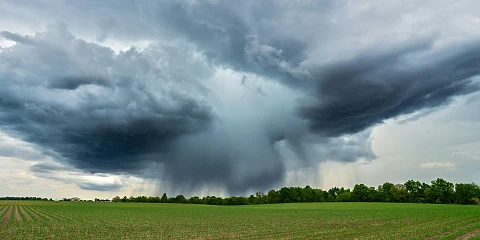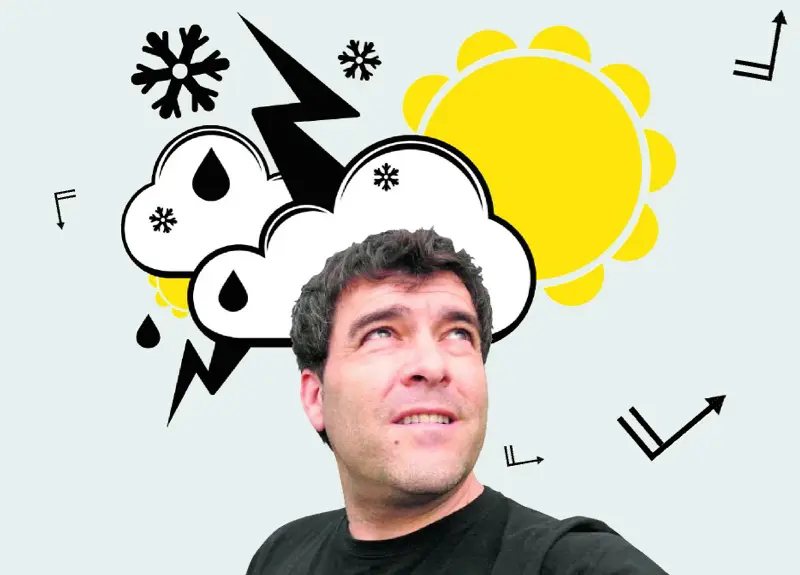
Learning more about Geoengineering with Emilio Rey
August 13, 2024
Let's delve into the topic of geoengineering by interviewing Emilio Rey, an expert in meteorology and former CEO of the startup Digitalmeteo.

How did you discover Geoengineering?
I first encountered the concept when I started frequenting meteorology forums—especially Meteored—and reading information and opinions from other enthusiasts and professionals in the field through various mailing lists. This was around 1995, and I was still connecting to those sources via modem. Back then, we didn't call it geoengineering or climate engineering; we referred to it as climate control experiments, particularly those associated with the dispersion of local severe storms using airplanes and rockets, and the dissemination of condensation nuclei in the form of silver iodide, known as cloud seeding. A few years later, in 2000, I installed an ADSL line at home and was able to access much more information. This led me to learn about the aberrant initiatives from Russia and the US at the end of World War II (like Project Popeye or Project Stormfury) and meet people deeply interested in the subject, including those from the INM (former AEMET). In 2003, we founded the first "storm-chasing squads" ('komandos kazatormentas' in Spain) through a website called tiemposevero.es, delving further into the aspects of potential meteorological and climatological modification, but on a small scale.
Do you think geoengineering will be a significant topic in the future?
Absolutely, but I fear it won't be on a large social scale, rather more relevant to certain governments, militaries, large corporations, and some universities. It won't go beyond that, in my opinion, because we still don't fully understand the mechanisms of planetary climate on a large scale. Without the ability to accurately model Earth's climate behavior, we will struggle to influence it globally.
Research and experiments will continue, but they will only be accessible to these types of organizations, likely driven by strong geopolitical and economic interests. Progress will come from the academic and scientific spheres, as well as from small companies with a strong focus on innovation, social responsibility, and the use of new tools—especially artificial intelligence—that bridge the worlds of entrepreneurship, education, and scientific study.
Can you tell us about a geoengineering initiative that you think makes sense?
There are several initiatives that have the potential to help our planet stop increasing in temperature and reduce the concentrations of harmful gases. The use of AI to better understand our climate system is promising, but none will have a global impact in my view. Human influence on a planetary scale is beyond our reach unless we all agree to act together. The evidence is that to have reached the current situation—where CO2 levels have risen globally, pollution in our cities has increased, and the state of our rivers and oceans has become increasingly unsustainable—humanity as a whole had to collectively use our cars and factories simultaneously, emit pollutants, and use plastics and other waste without control. This collective negative impact on the Earth's climate can only be reversed through actions of the same magnitude, globally, where each person takes responsibility and consciously works to heal our planet. Given our current point in history, this is unfortunately a utopia.
However, I'd like to mention initiatives like the Climate Model Alliance (CliMA), a coalition of engineers, scientists, and mathematicians from prestigious institutions like MIT, Caltech, and JPL. They are building the first global climate model that learns automatically from various data sources and will be able to make much more accurate climate forecasts, reducing the uncertainty associated with these predictions. We should keep a close eye on them.
What risks do you see in current geoengineering proposals?
There are many risks, the main one being the potential waste of time and resources on projects that are unrealistic. The loss of focus or the political and/or military use of many proposals is also a significant risk. Historically, these were the goals, such as post-war Russia using atomic bombs to divert river courses or hydrogen bombs to melt the Arctic. Thankfully, such aberrations were never carried out, but many ideas were extremely dangerous. Now, geoengineering is more often seen as a tool to help mitigate global warming rather than as a means of climate warfare or improving agricultural conditions in specific areas. However, we still don't fully understand the potential side effects we might be causing. So, caution is needed with certain experiments.
What other solutions do we have to combat climate change and pollution beyond geoengineering?
The development of knowledge and dissemination is undoubtedly crucial. There's still much to learn about how humanity impacts the Earth's climate system, how vulnerable our planet is, and its capacity for regeneration and self-regulation in the face of external changes. CO2 emissions are increasing, which is a fact, but some experts, like stratigraphy emeritus professor Luis Pomar and climatologist Antón Uriarte, argue that CO2 is innocent or even beneficial, suggesting that increased vegetation coverage is due to this CO2. This debate will continue for many years, far beyond a human lifespan or a single generation. Meanwhile, the use of technology, new quantum computers, and machine learning techniques on massive data sets will allow us to make significant quantitative and qualitative leaps in our understanding of the climate system.
Can we control the Earth's climate without causing a catastrophe?
I don't know, and I don't think anyone can say for certain. Currently, we don't even know if we will ever be able to control the planet's climate. Global impact will be difficult to achieve unless large-scale actions are undertaken, and all factors and potential side effects must be considered before implementation. The risk is high, as many of these measures could be minimizing or masking certain environmental problems. Perhaps the Earth has its own self-regulation mechanisms, and our initiatives might only disrupt that global climate self-control.
Our latest news
Interested in learning more about how we are constantly adapting to the new digital frontier?

Insight
February 5, 2025
Pharmaceutical tenders: top 5 obstacles and how to overcome them

Tech Insight
January 13, 2025
How to bring your application closer to everyone

Insight
December 10, 2024
Groundbreaking technologies today that will reshape the innovation landscape in 2025

Insight
December 3, 2024
Sustainable Development: Minimizing Digital Footprint and Optimizing Consumption
